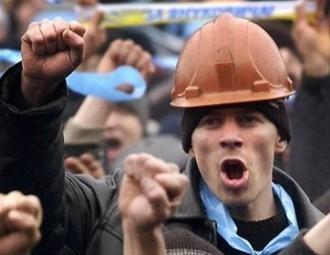Aliaksandr Jarashuk: Today’s situation for workers is not critical

In near perspective the probability of Belarusans taking part in some mass protest actions is quite small.
Such an opinion was expressed by the head of Belarusan Congress of Democratic Trade Unions (BCDTU) Aliaksandr Jarashuk in a conversation with the EuroBelarus Information Service.
“Now we often recollect the April events of 1991, when quite unexpectedly for the former Soviet Union community it was Minsk where the most large-scale strikes were held”, - reminded the head of the trade union.
Nevertheless, today’s situation, remarked Aliaksandr Jarashuk, is distant from the times of the dissolution of the USSR: “If to speak about some comparison with the situation of that time, the year of 1991 was the time when people stopped fearing and were free in their actions. Now the great fear predominating. Not only of some political repressions on the part of special services and the whole Belarusan regime machine, but also the fear of losing job, taking into consideration that more than 90 per cent of workers are on a short-term contract.”
One more reason, which the head of BCDTU believes to be the most important, is that on the whole today’s situation for workers is not critical.
At the same time Aliaksandr Jarashuk noted that even now we can speak about the growing tendency of the authorities to lose control of the socio-political situation in the country. “And I think that the situation is unlikely to return to the state it was in December 2010. As the main issue – about a change of socio-political policy – is not being solved. It was just the reason of a hard economic situation in 2011”, - reminded the representative of the union trade movement.
He has emphasized that the tendency of the deterioration of economic situation is becoming a serious reason of possible growth of dissatisfaction and social tension. And authorities understand it as well. That is why Aliaksandr Jarashuk believes the repressions to be used against members of independent trade unions on different enterprises of the country.
Nonetheless, is there no probability that the workers will react to the deterioration of Belarusan economic situation not with strikes and protest but with emigration and search for alternative ways of survival?
“I think we will observe the workers moving abroad as well. And we observe it even now, - agreed Aliaksandr Jarashuk. – It is a pity that those who depart are most educated, mobile, young and promising people who couldn’t fulfill themselves here. The young and educated mostly depart westward, whereas mass profession personnel, like builders, drivers, oil refining specialists and power engineering specialists – in the direction of Russia.”
In addition to that, as noted the head of BCDTU, “it will never be in such a way that suddenly everyne will depart”. “All the same a considerable part of people will stay here. Now we also observe that here and there people protest on the occasion of not paying wages, some spontaneous actions occur. Everything points to the fact that the socio-economic issues are the most painful for workers. While political situation affects common worker far less”, – emphasized Aliaksandr Jarashuk.
-
03.01
-
07.10
-
22.09
-
17.08
-
12.08
-
30.09



























